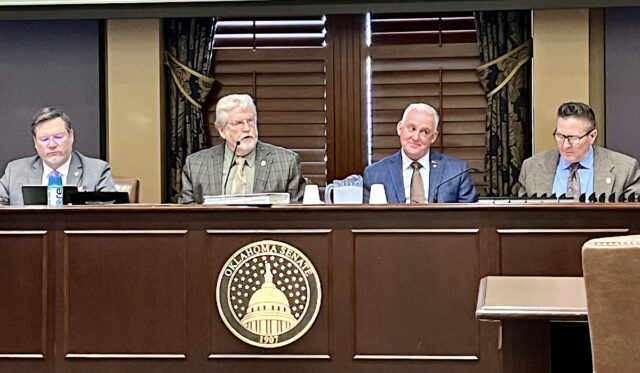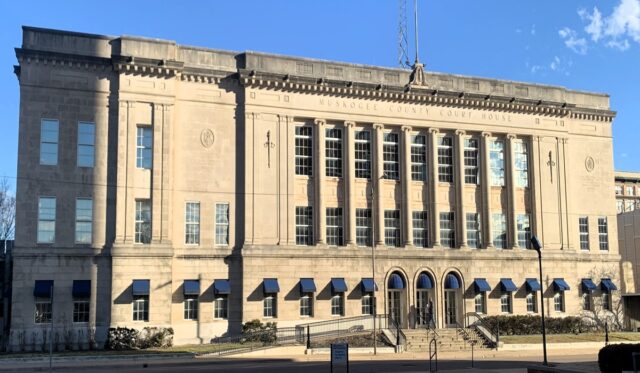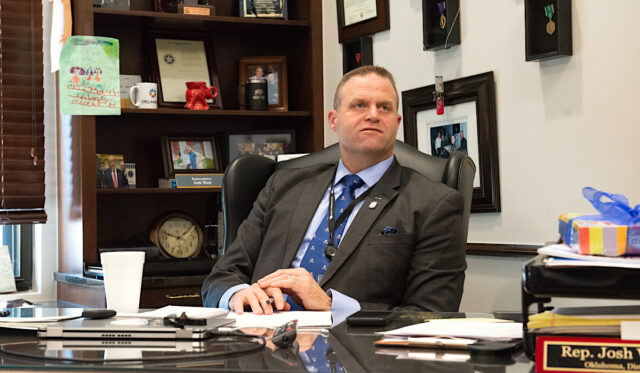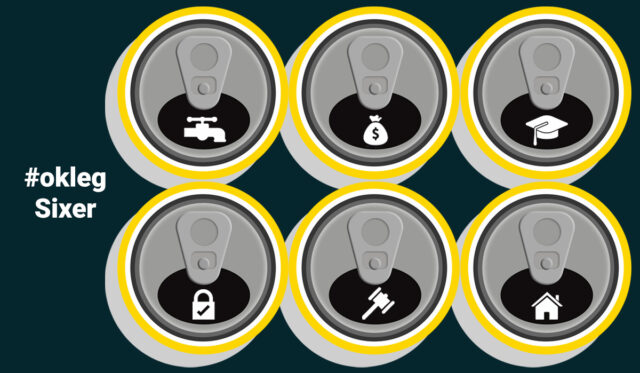One month into Oklahoma’s 2024 regular legislative session, much of the public conversation about Capitol topics has focused on tax cuts, education issues and simmering social policy proposals.
But because following bills can be like drinking from two firehoses at once, a few major issues worth watching have largely flown under the state radar despite ongoing conversations behind the scenes.
While separate NonDoc stories on other topics are forthcoming — subscribe for direct texts to avoid missing a headline — the following six-pack is aimed at cracking open some policy palaver for you to enjoy on a sunny day.
Use the arrows below to scroll between six important legislative topics worth watching.
1Beer is for drinking, water is for — metering?

If you didn’t know that concerns about drought, aquifer depletion and water use are hot topics in Oklahoma, you haven’t been paying attention.
Legislators have heard an earful, however, particularly in western Oklahoma where Sen. Brent Howard (R-Altus) and Rep. Carl Newton (R-Cherokee) are pushing different versions of a proposal to establish monitoring of regulated commercial water usage.
Howard’s SB 1341, which he called a work in progress following a U.S. Bureau of Reclamation report on water usage in the Luegert-Altus Irrigation District, proposes spot checks, auditing and testing by the Oklahoma Water Resources Board. However, Howard’s bill would only apply to a defined “critical groundwater management area” with a completed report from the U.S. Bureau of Reclamation. Functionally, that would limit his bill’s immediate impact to the irrigators in the Altus area where differences of opinion exist among commercial interests that use large amounts of water.
“We’ve had the Water Resources Board enacted since 1957 to be able to monitor the water usage — not just stream water, but also groundwater — and the findings in this [recent report are] that we believe there’s more water usage than what’s being permitted. And so part of it is just trying to get metering in on all of those wells,” Howard said. “It would apply to agriculture use, industrial use and commercial use — anything other than household use that’s protected in the constitution.”
Howard said that agriculture, industrial and commercial water consumers are already permitted by the state, but he said enforcement is limited.
“You have to make a yearly report your annual report on your permit, and there’s just no auditing of that,” he said. “I mean, the Water Resources Board doesn’t have the agents to go out and do spot checks or checks on those numbers, so what a user writes down is basically just what is accepted by the Water Resources Board.”
Newton agrees that concerns about aquifer depletion are serious, and he is running HB 3194, which advanced 12-1 from the House Energy and Natural Resources Committee. The bill would mandate that all water wells requiring groundwater use permits from the Water Resources Board “be equipped with water well flow meters or an alternative measuring system as defined by the board.”
“My area, we live above aquifers, and so I’m just trying to make sure that we are staying within our guidelines — just like staying within a speed limit as you’re going down the road — so we’re making sure we are being good stewards of our water,” Newton said. “(Right now), we’re on an honor system.”
Howard is also the Senate co-author for Newton’s bill, and although his Senate version would be restricted to his area of southwest Oklahoma, he said he has come around to the idea of requiring metering or measuring statewide for regulated wells used for industrial, commercial and agricultural purposes.
“As I’ve had more conversations with users, there’s concern within their own part (of the state) about the sustainability of the water and how many people are unpermitted or using over their allotments,” Howard said. “So I’ve actually had more people that are users say, ‘We would like to know those numbers, and we’d like to apply this statewide.’ However, the enforcement of it and growing that oversight, I think that’s the biggest part of it. Everybody likes a cop watching the speed limit until you’re the guy that gets pulled over. So it’s still going to be a little bit tricky on putting it in place.”
Newton said he does not consider the water metering or measuring bills to be an overreach of government.
“Not really, because I’m allowing them to use their measuring system, too. We may do some incentive for metering to help sell them metering and give them some help on that,” Newton said. “But right now it’s metering or measuring. You can use volume, measurements by pressure, size of the pipe, how long you ran it. You can tell how much water you used.”
Howard said he is still open to input on the bills from concerned parties.
“We’ve kicked this down the road for 30 to 40 years,” Howard said. “We need to do something. We’ve got this board already in place. I would like to start having full discussions about what that is, but if somebody has input — whether it’s the oil and gas industry, whether it’s my other irrigators — I want to know and I want this to be a bill that can eventually apply statewide and is workable law.”
When it comes to conservation efforts, lawmakers are also looking to further their attempted crackdown on some of the worst offenders when it comes to unauthorized water use: eastern red cedars.
Last session, lawmakers established a pilot program for removing the invasive species — which absorbs water to the detriment of other natural species and also provides dangerous fuel for wildfires — in the North Canadian River watershed.
Now, Rep. Mike Dobrinski (R-Kingfisher) and Thompson are running HB 3106 to take the red cedar elimination program statewide. The bill advanced unanimously from the House Agriculture Committee.
(Note: Use the arrows above to review more policy topics.)
2Agencies seeking supplemental appropriations for FY 2024

When lawmakers return for regular session each February, House and Senate budget leaders always receive requests for supplemental appropriations from state agencies that — for one reason or another — believe the dollars legislators allocated for them last year won’t be enough to fulfill obligatory tasks through the end of the fiscal year, June 30.
Such is the cycle of supplemental appropriations, and a million dollars here or a million dollars there will often be approved for certain agencies during Joint Committee on Appropriations and Budget meetings in late February or early March.
This year, however, it’s unclear when a JCAB might appear on the calendar owing to the Senate’s new appropriations process. To achieve the Senate’s new effort aimed at transparency, Senate Appropriations and Budget Chairman Roger Thompson (R-Okemah) and House Appropriations and Budget Chairman Kevin Wallace (R-Wellston) have largely limited their early-session sit downs to simply synchronizing their starting spreadsheets.
But according to a Feb. 5 list (embedded below) provided by Wallace, 10 state agencies have requested a combined $40 million in FY 2024 supplemental appropriations.
“That’s much higher than we have seen previously,” Wallace said.
Atop the list are a pair of requests stemming from recent reshuffling of administrative duties and the creation of new, stand-alone agencies.
After lawmakers created Service Oklahoma and changed apportionment percentages accordingly, the Department of Public Safety is requesting $19.5 million, which would include $4 million for a trooper academy, $4.5 million for costs incurred by the Workday system’s implemented change to bi-weekly pay, and $11 million to cover personnel costs for employees who remain at DPS doing other work even after the state’s driver’s license programs were shifted to Service Oklahoma.
“If you look at DPS, they’re asking for some true-up and some other things based on the fact that we created Service Oklahoma,” Wallace said. “By creating new agencies and separating (duties), you’re seeing some of these requests. [The Oklahoma Tax Commission] was also involved in that Service Oklahoma (change), but they didn’t ask for a supplement.”
Meanwhile, the Oklahoma Medical Marijuana Authority has requested an additional $10 million to cover personnel, IT and equipment costs associated with increased enforcement efforts, as well as the agency’s new quality assurance laboratory.
“The same thing with OMMA. They asked for $53 million, and we appropriated them $37 million, but their additional supplemental request gets them closer to their original ask for the agency’s operations,” Wallace said. “As we restructure all that, there were some changes with some of the fees. We restricted their fund after July 1, but they could utilize that fund before for operations. (…) They did not access that fund as I expected them to. So currently that fund now has handcuffs on it, and money has to be appropriated out of it. (…) We’ll have to dig in and figure out what the right amount is, but that’s all justified.”
Thompson, however, said in February that he was “not there yet” on OMMA’s requested supplemental appropriation.
“I don’t know that they need all of those supplementals,” Thompson said.
Other requests include $1.45 million for the District Attorneys Council to improve sexual assault investigations and $1 million for the Attorney General’s Office as it stands up a new division for enforcing rules related to pharmacy benefit managers (PBMs) that had previously been handled by the Insurance Department.
The Oklahoma Tourism and Recreation Department has also requested $2.5 million to support management of four travel information centers that had previously been managed by tribes under agreements that the Stitt administration did not renew.
“Tourism is very adamant. They state that they need their supplement right now,” Wallace said. “What they want is for employees that they’ve brought on — actually covering their payroll expenses. Now they’ve had to bring in employees, and they need to make payroll, so they’re probably cannibalizing other parts of their budget just to pay the people.”
Thompson expressed frustration with the travel center situation and OTRD’s supplemental request.
“It’s been my position and still is, ‘You had money to pay for those.’ And the governor decided we didn’t want to partner anymore. So figure out how to deal with it. You willingly turned down a partner and willingly turned down money? I’m not going to bankroll that,” Thompson said. “It’s just crazy to me. If you’ve got income coming in, why should the state pick up the tab at this point — taxpayers? “Why not partner? Of course, that’s a heavy political question, and we know how the governor feels about that.”
(Note: Use the arrows above to review more policy topics.)
3Act naturally: Time to hike Oklahoma’s film rebate?

While it wouldn’t be a legislative session without discussion of expanding film-industry investments in Oklahoma, some of the dynamics governing this year’s negotiations appear to be a little different.
Sure, film proponents across the board would like to see lawmakers raise Oklahoma’s rebate program from its current $30 million figure to the $80 million or $90 million numbers fluttering around Capitol rafters.
But broader disagreement has surfaced about which types of projects to prioritize: big-budget blockbusters likely to employ teams of people who spend major money on food and lodging, or smaller local projects likely to spur the careers of local filmmakers and industry employees with existing roots in Oklahoma.
After advancing from the House on a bipartisan 72-22 vote last session, HB 1362 remains an active round in the Senate where it is co-authored by Vice Chairman of Appropriations and Budget Chuck Hall (R-Perry). Lt. Gov. Matt Pinnell has stumped for the bill to raise the rebate program cap, arguing he has “turned away $80 million of economic development projects.”
But despite recognizing early successes, Hall has pumped the brakes on expanding the cap.
“That incentive is only two years old. I’ve told the industry that I think we need to let that play out and make sure we’re getting the return on investment we’re expecting,” Hall said. “There are several in the industry, of course, that would like to see that incentive raised. They feel it would be utilized.”
Chad Warmington, president and CEO of the State Chamber of Oklahoma, said expanding the film incentive is a good idea, particularly following a 2021 measure reforming the program.
“We are in favor of growing the film industry here in our state and all the businesses around it. SB 608 increased the state dollars available, but it also made the rebate a better value for Oklahoma. It’s proven that over the last two years,” Warmington said. “Raising the incentive to make movies in Oklahoma is not just good for the film industry, but it continues to build the infrastructure needed for permanent growth of this industry in Oklahoma.”
House Majority Floor Leader Jon Echols (R-OKC) has offered HB 3964 as his own idea for how Oklahoma should incentivize the film industry. Instead of trying to compete with the massive incentives in larger states like California, Texas and Georgia, Echols has proposed creating an Oklahoma incentive specifically for “live studio audience episodic TV” shows, also known as sitcoms.
“I think we’re doing a good job. But I think Oklahoma should find its niche and fill a niche,” Echols said. “The idea behind pushing live-audience experiences is that I think it’s an area Oklahoma can differentiate itself right now.”
He said creating live-audience experiences could drive local economic activity over a longer timeframe.
“That’s continuation. That’s jobs that come back and come back and come back. If you get one hit show, you could have something for eight years,” Echols said. “If you have one [Twisters], that’s unbelievable. It’s great. But what you get with one Twister 2 is one Twister 2.”
Hall said he appreciates Echols’ perspective and is “leaning” in that direction.
“I don’t think that we would be willing to provide the money to be all things to all people. I think we are needing to carve ourselves out a little niche. And live production — locally filmed, live-studio, episodic things — it kind of excites me. I think it could potentially be some good, wholesome entertainment. It could be a destination,” Hall said. “As far as the holdover bill from last year, with the grocery tax elimination, these uses of recurring dollars, with the other needs we have in our state — I just don’t see that we have the budget to be able to see that bill advance forward with that increase in the incentive.”
(Note: Use the arrows above to review more policy topics.)
4With housing needs highlighted, bills moving forward

An under-the-radar policy discussion last session became one of the Oklahoma Legislature’s largest accomplishments in 2023: The creation of new programs to incentivize housing development and support homebuyers with down-payment assistance. As rules for the three programs are now approved by Gov. Kevin Stitt, Oklahoma Housing Finance Agency leaders expect developers and applicants to take advantage of the $215 million state investment sooner rather than later.
Still, new housing developments supported by lawmakers’ actions last session remain years from completion, and a multitude of other problems exist for housing-insecure Oklahomans who face limited options, opportunities and protections when it comes to accessing and remaining in safe homes.
Because housing laws, regulations and market forces are complicated and multifaceted, the Oklahoma Academy devoted its 2023 Town Hall policy plenaries to to the topic of housing. Now, at least two bills seek to provide more flexibility for renters at risk of losing their homes.
Sen. Dave Rader (R-Tulsa) is running SB 1761 to create a “Rent Guarantee Program” within the Housing Finance Agency, which would allow households at or below 60 percent of area median income to receive private or public assistance of up to $2,000 in an effort to help them make rent and remain housed. Individual landlords could receive up to $5,000 from the program to cover unpaid rent, eviction costs and property damage. The bill advanced 16-3 from the Senate Appropriations and Budget Committee on Feb. 28.
Weeks prior, Rader said the concept caught his attention as a way to encourage landlords to rent housing units to people reintegrating after incarceration.
“It was brought to me by a gentleman who deals with individuals in that type of situation. He’s involved in trying to get people back on their feet,” Rader said. “We know that for the formerly incarcerated to have the job and a place to stay, the chances of recidivism go way, way down.”
Although the bill proposes allowing the program to use state dollars if available, Rader said he imagines private donations and federal funding comprising the program revenues for OHFA.
“There’s a fund here, and if something might be messed up, you could use that fund to help pay for whatever damage there might be,” Rader said.
Rader said he knows there are simply not enough housing units on the market for people seeking affordable housing, although he said he needs to learn more about how housing programs and processes work.
“If that helps us have more places available, then we’re going to do a better job of not seeing guys come back into the [Department of Corrections],” he said.
Another bill in the Senate would extend from five to 10 days the minimum time frame between eviction notice and a court proceeding.
SB 1575 by Sen. Julia Kirt (D-OKC) advanced 8-2 from the Senate Judiciary Committee last week. The bill would also increase from three to seven days the amount of time between a court summons being served and the date of a trial, although both expedited time frames would remain for instances of property damage or illegal activity.
“SB 1575 puts in statute what responsible, fair landlords already do when tenants can’t pay,” Kirt said in a press release. “People who have been evicted are less likely to find future housing and employment. We need our system to encourage resolution before eviction whenever possible.”
A third bill, SB 1244 by Sen. Julie Daniels, would extend from only metro areas to all parts of the state a sales tax exemption on personal property purchased by nonprofit organizations primarily serving homeless persons.
Daniels (R-Bartlesville) said her community in Washington County has two facilities serving the unhoused, and she was approached about extending the sales tax exemption beyond the Oklahoma City and Tulsa metropolitan areas.
“The sales tax exemption was adopted in 2004 or 2005. At that time, perhaps the homeless issue was one that was centered on the metropolitan areas. But now, homelessness is something that communities of different sizes deal with, including some in my district,” Daniels said. “Homelessness now is an issue statewide, and so anybody who has a facility that provides services for them ought to have the sales tax exemption.”
(Note: Use the arrows above to review more policy topics.)
5As judicial pay question lingers, so does evaluation concept

One policy proposal that fell apart late last session still appears to have legs this year — at least if House Appropriations and Budget Chairman Kevin Wallace (R-Wellston) gets his way.
Wallace authored HB 1022X during last year’s concurrent budget-matter special session to create a new “judicial performance evaluation” program. Despite passing the House and appearing to be part of a grand deal between chambers, HB 1022X failed 15-29 in the Senate, reportedly after some district judges voiced their displeasure with the concept of receiving evaluations from a secretive panel that would analyze feedback from attorneys, plaintiffs and defendants.
“It’s a policy discussion that we need to finish,” said Senate Judiciary Committee Chairman Brent Howard (R-Altus). “And I think that we will have those conversations here in the very near future. Funding went behind it. The funding was put into the district court system, and we either need to look at what that funding is — as far as continuing (it) — or put the policy behind it that goes with it.”
Wallace said near the start of session that he is optimistic a deal will get done.
“I’ve been told their judicial association is for it. I’ve been hearing the Supreme Court justices and Court of Civil Appeals and the criminal court, those justices are for it. I think it’s definitely got more opportunity and traction this session than it did last,” Wallace said. “I’ve worked long and hard with the courts [and have] made some changes.”
Wallace said he understands why judges might hesitate to support a new program for judicial evaluation, even if feedback and records are supposed to be completely private.
“It’s not an I-got-you bill. It’s nothing like that,” he said. “It’s just trying to improve the judicial system and making sure that the judges get the resources and training they need.”
Wallace’s argument for increased training and feedback for judges was bolstered this interim when new Lincoln County District Judge Traci Soderstrom got caught sending hundreds of text messages and scrolling Facebook during a murder trial in Wallace’s district. Soderstrom, who made derogatory remarks about a prosecutor’s appearance, resigned last month ahead of a removal action pushed by the Oklahoma Supreme Court’s chief justice.
Meanwhile, lawmakers are also tasked with considering a proposed 17.8 percent pay raise for all judges that was recommended by the Oklahoma Board on Judicial Compensation in September. The Legislature can modify or reject the pay raise recommendation, but if lawmakers take no action before adjourning in May, the increase would take effect automatically.
“I do think there’s a strong chance something will happen (on judicial evaluation), and ironically this is a year that the Judicial Compensation Board recommended that they need a raise as well,” Wallace said. “So I’m getting a lot of people coming to me now.”
(Note: Use the arrows above to review more policy topics.)
6Did the Texas data privacy act clear a path in Oklahoma?

For several years, Rep. Josh West has been pushing to protect Oklahomans’ personal data rights, advancing multiple proposals out of the House only to see them stagnate in the Senate.
But after the Texas Legislature passed and Gov. Greg Abbot signed the Texas Data Privacy and Security Act last summer, some Oklahoma State Capitol lobbyists sense a potential deal could be brokered in the Sooner State over how companies can collect and sell people’s personal data.
West (R-Grove) sees signs of hope as well, saying some companies and organizations that have historically opposed his efforts reached out of the interim “to sit down for a conversation.”
“They kind of see the writing on the wall, so they want to be in the conversation, at least,” West said. “You know, we’re always looking for the perfect, I guess, but anything is better than nothing, because we’ve been doing nothing for the five years that I’ve had the bill.”
By an 84-11 bipartisan vote, House members sent West’s HB 1030 to the Senate last year, where it was referred to the Senate Rules Committee.
The bill remains alive this year, and West said co-author Sen. Brent Howard (R-Altus) is working with stakeholders to find agreeable language for a committee substitute based on what has worked elsewhere. Red and blue states alike have passed some sort of data privacy law, including: California, Colorado, Connecticut, Indiana, Iowa, Montana, Tennessee, Virginia and Utah.
“Even if it’s opt-out, at least give me a say (on how my data is collected and used),” West said. “I would take that as a positive movement forward, because that would be better than the same thing that has been happening every year.”
(Note: Use the arrows above to review more policy topics.)
-

7Tres Savage
Tres Savage (William W. Savage III) has served as editor in chief of NonDoc since the publication launched in 2015. He holds a journalism degree from the University of Oklahoma and worked in health care for six years before returning to the media industry. He is a nationally certified Mental Health First Aid instructor and serves on the board of the Oklahoma Media Center.




















